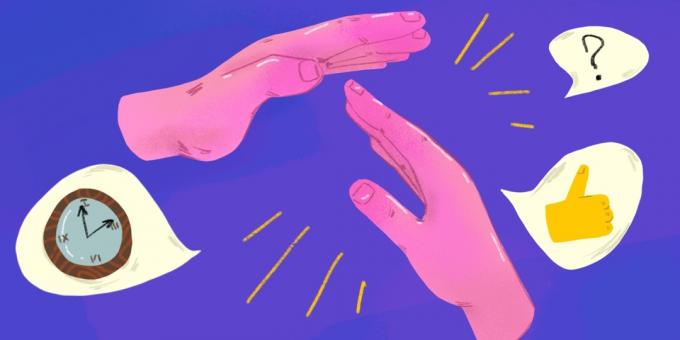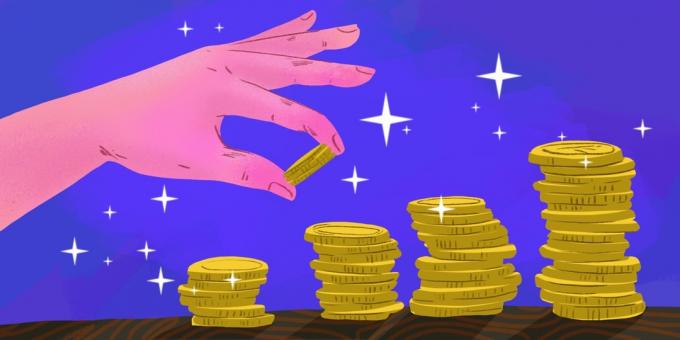5 tips for those who don't know how to save money but really want to learn
Get Rich Tips / / January 02, 2021
Why you can't save money
The long and complex evolution of humans as a species is to blame for the fact that we respond to advertising calls and can quickly decide on an unplanned purchase. The living conditions of our ancient ancestors were so cruel that putting aside a piece of meat for tomorrow was tantamount to saying goodbye to it forever. Meat, as well as the person himself, could be eaten by another predator tomorrow or even today. Having lived hundreds of thousands of years in such realities, we have learned to take when they give, and run when they beat. It is not surprising that now it is difficult for humanity to overcome their primitive instincts. However, we are intelligent and have sufficient mental capacity to make deliberate and balanced decisions.
The 2002 Nobel Prize in Economics Daniel Kahneman argued that two systems are responsible for making decisions in the human brain.
Actions within system 1 are fast, automatic, effortless, associative, and difficult to control or modify. Actions within System 2 are slower, more consistent, effortful, and consciously controlled. In addition, they are relatively flexible and potentially subject to rules.
System 1 is responsible for the emotional aspect of decision making. It is represented by the nucleus accumbens (which contains a lot of dopamine - the hormone of joy and pleasure), amygdala (responsible for emotions, including fear) and the orbitofrontal cortex (performs functions of an arbitrator).
Together, it works like this. Let's say you saw fashionable sneakers on the counter, at the same second the nucleus accumbens reacted violently, because they are beautiful and desirable. The amygdala also showed activity: the price of new shoes is quite high, the fear of being left without money for other needs is very strong. At this point, the orbitofrontal cortex compares which is stronger, desire or fear, and makes a verdict. All processes occur so quickly that you do not control them, only in the end you get the answer from an irrational system 1.
How to learn to save
In contrast to System 1, Daniel Kahneman gives System 2. It is responsible for common sense, intelligence, mindfulness, prudence, long-term planning and is represented by the frontal region of the brain, the so-called dorsolateral prefrontal cortex.
Naturally, she is interconnected with her "emotional" partner. The more one system is developed in a person, the weaker the other. So, pondering your choice and weighing decisions, you literally pump your mind. But this takes time. For System 2 to win the fight for the final decision, give your brain time to evaluate the usefulness of a spontaneous purchase, and for now read the reviews on the quality of the product yourself. By the way, there are other tricks as well.
1. Pay the essentials right after your paycheck
Each of us has a basket of compulsory payments - for example, utilities, payments on a loan or for the education of children, medical or car insurance. All this must be paid in the first days after the paycheck. Otherwise, your idea of how much money can be spent without a twinge of conscience will be wrong. In addition, if you deposit the required amounts right away, the risk of late payment and getting a penalty will decrease significantly. In order not to forget about all this, set up automatic bill payment in your Internet Bank.
By the way, it is better to put it in the piggy bank also right after the account is replenished. If you know how much free money is left before the end of the month, it will be easier to conduct internal dialogues about the delights of impulse purchases and iron willpower.
2. Make fear your ally

In commerce, fear works as a double agent. He entices and convinces that you will miss out on an extremely lucrative offer if you do not buy the product right now. This is signaled by the nucleus accumbens. At the same time, the fear of spending a large sum, for example, on another new thing, includes common sense in buyers. The amygdala plays for him. How can you lure the agent over to your side and force the orbitofrontal cortex to make the right choice?
First, always remember that fear is a convenient manipulation tool. If in a store you suddenly wanted to urgently buy a product, because it seemed that it would soon be disassembled, then think twice about how real this apparent deficit is. For example, when the exchange rate of the ruble changes or other problems arise in the country, people massively buy household appliances and products with long shelf life. And then they don't know what to do with five TVs and twenty kilograms of buckwheat. Therefore, it is important to make sure that you really need the purchase and that no one is trying to manipulate you.
Second, think about how much money you spend on small but frequent purchases. A simple example: calculate how much you spend on your daily espresso every year before work. Let's say a cup of coffee costs 120 rubles. In 2020 247 working days. Buying an invigorating drink on the way to the office, you spend a total of 29,640 rubles. Of course, we didn't include vacation, sick leave, or business trips. But surely on some of the difficult everyday life you drink more than one cup. When you realize the scale of the costs, come up with something useful to spend the entire amount. And coffee can be made at home and taken with you in a thermo mug.
3. Take time out before rash spending
Use the fear mechanism to your advantage. If you see an attractive product while shopping, do not rush to the checkout. Make it a rule to buy an unplanned item only after you give yourself time (hour-two-three or, maybe even the whole day) think, analyze the need to purchase and read reviews about quality product. Use time-outs before buying, let the “smart” part of your brain do the work for you, buy time for it. Fight momentary whims with their own methods.
4. Save more tomorrow than today

In our minds to postpone is to deprive ourselves of pleasure, and this is painful and unpleasant. A little trick will help to "pain relief" the process: try to fool your brain with the scheme "there will be more next time".
Here's an example. If the income in your family grows by 10-15% per year, then start saving first 1% of your salary every month, then gradually increase to 3, 7, 10, 12, 15%. The essence of this method is that you know and understand that you can replenish the piggy bank immediately 15% of your salary. But this will significantly affect the wallet. And if you get used to it gradually, step by step, you will come to the final indicator without resentment about austerity measures. In addition, this scheme will help not to miss out on contributions to the piggy bank during difficult months.
5. Make money work for you
In order not to take away the hard earned money from the heart every month, you can put money on a deposit, buy bonds or stocks. Each option has its own advantages and disadvantages.
Deposit
Pretty simple and straightforward way. On average, banks today offer income from deposits in the amount of 4-6% per annum. Part will be absorbed by inflation (in 2019 it made up 3%), and what remains is all yours. This option is more suitable for those who want to save money, rather than increase.
- Benefits: simplicity, stability.
- Disadvantages: low profitability.
Bonds
These documents indicate that the company (or the state in the case of federal loan bonds) took you have borrowed money and in return undertakes to pay interest deductions and return the entire loan at the end of the contractual term. In most cases, one bond costs one thousand rubles. And the average yield on Russian bonds is about 7-12% per annum.
- Benefits: experience in personal wealth management, learning a new financial instrument.
- Disadvantages: low profitability.
Promotions
By purchasing shares of a particular company, you get the opportunity to participate in the management of the company and claim a part of its profits. You can also trade stocks and make money on the price difference.
- Benefits: high dividends when buying shares of a financially successful company.
- Disadvantages: the need to carefully study the company's dividend policy for previous years, a high risk of losing money in speculation.
Endowment life insurance policy
It is a financial product that combines savings and savings. Its essence is that a person insures his life for a certain period of time (usually from 5 to 15 years) in a timely manner and in full pays premiums. If during the validity period of the policy, the policyholder dies or becomes seriously ill (conditions may vary), the company will make the payment - to himself or to the beneficiaries specified in the contract. If he lives up to the end of the agreed period, he will receive all the money he contributed with interest or investment income.
- Benefits: not just accumulation of funds, but life insurance. These funds are not included in the inheritance, nor can they be confiscated, divided in case of divorce, seized or collected in court. Among the indisputable advantages - tax deduction.
- Disadvantages: tax deduction can be issued only if the official average monthly salary is at least 10 thousand rubles; obligatory timely payment of contributions (otherwise the contract will be canceled and the previously paid amount will not be returned); cases that occurred during the commission of a criminal offense or in a state of intoxication are not considered insurance; in the classic version of endowment life insurance, there is no significant income.
Learn more about "Valuable asset"


